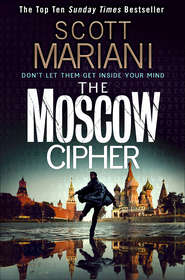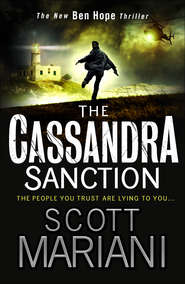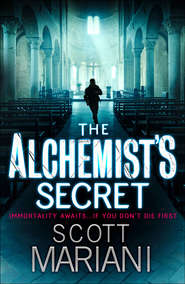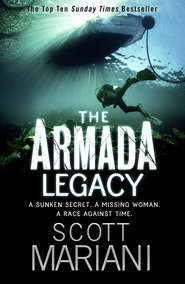По всем вопросам обращайтесь на: info@litportal.ru
(©) 2003-2024.
✖
The Ben Hope Collection: 6 BOOK SET
Автор
Год написания книги
2018
Настройки чтения
Размер шрифта
Высота строк
Поля
He nodded. ‘One of our most curious and fascinating patients. He’s been with us for about five years now. His name is Rheinfeld, Klaus Rheinfeld.’
‘His name sounds like Renfield, from the Dracula story,’ Anna commented.
‘That’s quite apt, although I haven’t yet observed him eating flies,’ Legrand replied, and everyone laughed. ‘But certainly he’s an interesting case. He’s a religious maniac. He was found not far from here, in a village, by a priest. He self-mutilates–his body’s covered in scars. He raves about demons and angels, convinced he’s in Hell–or sometimes in Heaven. He continually recites Latin phrases, and is obsessed with meaningless series of numbers and letters. He scrawls them all over the walls of his ce-…his room.’
‘Why do you allow him to have a pen, Dr. Legrand?’ asked Madame Chabrol. ‘Could that not be dangerous?’
‘We don’t, any longer,’ he said. ‘He writes them in his own blood, urine and faeces.’
Everyone around the table looked shocked and disgusted, except Anna. ‘He sounds terribly unhappy,’ she said.
Legrand nodded. ‘Yes, I believe he probably is,’ he agreed.
‘But why would anyone want to…mutilate themselves, Edouard?’ asked Angélique, wrinkling her nose. ‘Such an awful thing to do.’
‘Rheinfeld displays stereotypic behaviour,’ Legrand replied. ‘That is to say, he suffers from what we call an obsessive-compulsive disorder. It can be triggered by chronic stress and frustration. In his case, we think that the mental disorder was caused by his years of fruitless searching for something.’
‘What was he searching for?’ Anna asked.
Legrand shrugged. ‘We don’t really know for sure. He seems to believe he was on some form of quest for buried treasure, lost secrets, that sort of thing. It’s a common mania among the mentally ill.’ He smiled. ‘We’ve had a number of other intrepid treasure hunters in our care over the years. As well as our share of Jesus Christs, Napoleon Buonapartes and Adolf Hitlers. I’m afraid they’re often not very imaginative in their choice of delusions.’
‘A lost treasure,’ Anna said, half to herself. ‘And you say he was found not far from here…’ Her voice trailed off in reflection.
‘Can nothing be done to help him, Edouard?’ asked Angélique.
Legrand shook his head. ‘We’ve tried. When he first came to us, he received psychoanalysis and occupational therapy. For the first few months he appeared to respond to treatment. He was given a notebook to record his dreams. But then we discovered that he was filling its pages with insane babble. Over a period of time, his mental state deteriorated and he began to self-mutilate again. We had to take away his writing implements and increase his medication. Since then, I’m afraid to say, he’s descended deeper and deeper into what I can only describe as madness.’
‘What a terrible pity,’ Anna breathed.
Legrand turned to her with a charming smile. ‘In any case you would be more than welcome to have a tour of our little establishment, Anna. And if it could help you gain inspiration for your book, I could arrange for you to meet Rheinfeld in person–under supervision of course. Nobody ever comes to see him. You never know, it might do him good to have a visitor.’
31 (#ulink_113e3820-062c-5352-8b50-d06e71c41fee)
Paris
The pieces of the puzzle were virtually flying together for Luc Simon. The description that the two seriously embarrassed officers had given of the man who’d bundled them into Roberta Ryder’s cupboard exactly matched Ben Hope.
Then had come the report about the Mercedes limo involved in the recent railway incident. The car itself was hot as hell. No registered owner. False plates. Numbers filed off both engine and chassis. Its internal locking system had been altered like a kidnap car. It looked as though it had been used for that kind of purpose too, as someone had obviously been trying to shoot their way out of it with a 9mm handgun.
Whoever that someone was, judging by the analysis report on the spent 9mm case found in the back, they were the same person as the mystery shooter from the scene of the riverside killings. And who was he? It had seemed impossible to find out. But then the cops at the scene of the railway incident had found a business card inside the Mercedes. The name on the card was Benedict Hope.
There was more. In the parking lot of a nearby bar-restaurant they’d found the Citroën 2CV that had been mixed up in the railway incident. The missing grille badge, traces of paint from the Mercedes, even the dirt on the wheels, all matched the railway scene. The 2CV was registered to Dr. Roberta Ryder.
And it got even better. When the forensic team had gone through Ryder’s apartment with a fine-tooth comb, they’d found something. Right in the spot where she’d claimed her attacker had been lying dead, a speck of blood that whoever had cleaned the place up had missed. Simon bullied forensics into the fastest DNA test they’d ever done, comparing it against samples from Ryder’s hairbrush and other personal effects. The blood wasn’t hers. It did, however, match DNA samples from a grisly find that had turned up in the Parc Monceau. A severed human hand.
The hand’s previous owner had been one Gustave LePou, a criminal with a long history of sex offences, aggravated rape, assault with a deadly weapon, burglary and two suspected murders to his credit. It looked as though Ryder had been telling him the truth after all. But why had LePou been in her apartment? Was it just burglary? No chance. Something bigger was going on. Someone must have hired LePou to kill her, or to steal something from her–or maybe both. Simon felt like kicking himself that he hadn’t taken her seriously at the time.
More questions. Who had covered up the traces of LePou’s death, removed his corpse from Ryder’s apartment, chopped it up and tried, rather unsuccessfully, to dispose of it? What was the connection with Zardi, the laboratory assistant, and had the same people killed him? Where did Ben Hope fit in–was he the Englishman who Roberta Ryder had told him was in danger? If the railway incident had been meant to kill Hope, when Simon had seen him later that evening he looked pretty cool for someone who’d just narrowly escaped a horrific death. Where were Hope and Ryder now? Was Hope predator or prey? The thing was a complete enigma.
Simon was sitting in his cramped office drinking a coffee with Rigault when the expected fax came through from England. He tore it out of the machine. ‘Benedict Hope,’ he muttered as he read. ‘Thirty-seven years of age. Oxford educated. Parents deceased. No criminal record, not a parking-ticket. Squeaky clean, the bastard.’ He slurped his coffee.
He passed the sheet to Rigault as the fax started churning out a second page. It spat the paper into his hand and he read it, his eyes darting along the lines. Across the top of the sheet was the British Ministry of Defence letterhead. There was a lot of text below. Official stamps and confidentiality warnings in large bold print everywhere. The second page was more of the same. So was the third. He whistled.
‘What’s that?’ Rigault asked, looking up.
Simon showed him. ‘Hope’s military record.’
Rigault read it and his eyebrows rose. ‘Fuck me,’ he breathed. ‘This is serious stuff.’ He looked up at Simon.
‘He’s our mystery shooter, no doubt about it.’
‘What’s he doing? What’s going on?’
‘I don’t know,’ Simon said, ‘but I’m going to bring him in and find out. I’m putting out an alert on him right now.’ He picked up the phone.
Rigault shook his head and tapped the fax printout with his fingers. ‘You’re going to need half the French police force to catch this fucker.’
32 (#ulink_6b2818b8-2ffa-5015-89d9-a384e9ac90e1)
The drive southwards down the autoroute from Paris was long and hot. At Nevers the motorway was interrupted for a while and they took the Nationale road as far as Clermont-Ferrand, then drove back onto Autoroute 75 heading towards Le Puy Ben’s destination was still a long way south, down in the Languedoc region where he could pick up the trail of Klaus Rheinfeld and, he hoped, make some progress on his search.
With only Fulcanelli’s half-read Journal for guidance, he still had no clear idea of what he was even looking for. All he could do was follow the thin clues as best he could and hope that things got a bit more promising along the way.
Roberta was asleep next to him, her head rolling on her shoulder. She’d been sleeping for the last hour or so, which was about the same length of time he’d known for sure that they were being followed. The blue BMW that he was now watching with half an eye in the rearview mirror, keeping pace with them through the traffic, had been on their tail since sometime after Paris.
The pursuing car had first caught his attention at a refuelling stop when the Peugeot had been ahead in the line. The four men in the BMW had been acting jittery. He could tell they didn’t want to lose sight of him.
They headed back onto the road, and Ben tested them. Whenever he overtook a slower vehicle in front of him, the BMW would follow. When he slowed right down to a pace guaranteed to annoy other motorists, the BMW followed suit, ignoring the blaring horns of the indignant drivers until Ben accelerated and it accelerated with him. There was no doubt about it.
‘Why’re you driving so erratically?’ Roberta complained sleepily from beside him.
‘Just my erratic personality, I guess,’ he replied. ‘Actually, I hate to tell you this, but we’ve got a friend. The blue BMW,’ he added as she twisted round in her seat, suddenly wide awake.
‘You think it’s them again?’
He nodded. ‘Either that, or they want to ask directions.’
‘Can we get out of it?’
He shrugged. ‘Depends how sticky they are. If we can’t shake them off, they’re going to follow us until we get to a quiet road and then they’re going to try something.’
‘Try what? Don’t answer that. See if you can shake them.’
‘OK. Hang on tight.’ He dropped down two gears and accelerated hard. The Peugeot surged forwards, weaving as he turned hard to overtake a truck. A horn sounded from behind. The roar of the engine filled the car. Ben glanced in the mirror and saw the BMW giving chase, dipping in and out between lanes. ‘If that’s the way you want it,’ he breathed, and pushed the accelerator down harder.
Up ahead, a lorry was pulling out of its lane. The Peugeot darted into the gap and overtook it on the wrong side. The lorry gave a furious wobble as it shrank fast in his mirror, its airhorns blasting angrily.
‘Are you suicidal?’ she yelled over the engine noise.











